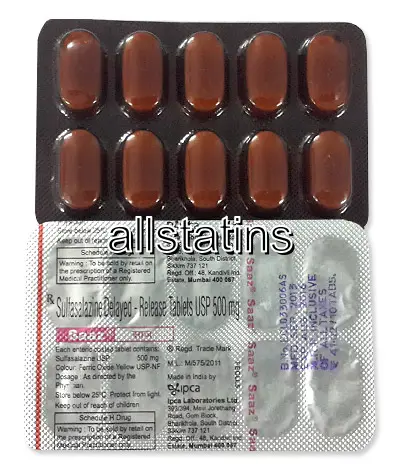Buy Sulfasalazine Online in the USA at All Statins
| Package | Dosage | Price | Price per Dose | |
|---|---|---|---|---|
| Dosage: 500mg | ||||
| 360 pill | 500mg | $690.67 | $1.92 | |
| 270 pill | 500mg | $538.18 | $1.99 | |
| 180 pill | 500mg | $394.66 | $2.19 | |
| 120 pill | 500mg | $288.82 | $2.40 | |
| 90 pill | 500mg | $231.41 | $2.57 | |
| 60 pill | 500mg | $170.41 | $2.85 | |
| 30 pill | 500mg | $105.83 | $3.50 | |

Sulfasalazine Description
Introduction to Sulfasalazine
Sulfasalazine is a medication commonly used in the treatment of inflammatory bowel diseases and rheumatoid arthritis. It is a combination drug that has been in use for decades to help manage chronic conditions characterized by inflammation. Its effectiveness has been well-documented, making it a popular choice among healthcare providers for specific conditions. When considering this medication, understanding its purpose, mechanisms, and potential side effects can help patients make informed decisions.
How Sulfasalazine Works
Sulfasalazine belongs to a class of drugs known as aminosalicylates. It works primarily by reducing inflammation in the gastrointestinal tract and joints. Once ingested, it is broken down in the colon by bacteria into two active components: sulfapyridine and mesalamine. Mesalamine exerts its anti-inflammatory effects directly on the lining of the bowel, helping to soothe swelling, redness, and irritation. Sulfapyridine, on the other hand, has some antibacterial properties and may contribute to the medication's overall effects. This dual action makes sulfasalazine effective in alleviating symptoms of inflammatory diseases.
Uses and Benefits
Sulfasalazine is primarily prescribed for conditions like ulcerative colitis, Crohn’s disease, and rheumatoid arthritis. Patients suffering from ulcerative colitis benefit from its ability to decrease the frequency and severity of flare-ups. In rheumatoid arthritis, it helps reduce joint pain, swelling, and stiffness, enabling better mobility and quality of life. Many users report significant improvements in their condition when on this medication, often experiencing symptom relief within a few weeks of starting therapy. Its long-standing track record provides reassurance about its efficacy and safety when used appropriately under medical supervision.
Potential Side Effects and Precautions
While sulfasalazine is generally well tolerated, it can cause side effects in some individuals. Common adverse reactions include nausea, headache, rash, and occasional dizziness. Some patients may experience gastrointestinal disturbances such as diarrhea or abdominal discomfort. More rarely, blood disorders like leukopenia or anemia can occur, necessitating regular blood monitoring. Allergic reactions, although uncommon, can be severe and require immediate medical attention. Patients with a known allergy to sulfonamides or salicylates should avoid this medication. Additionally, it is important to inform healthcare providers about other medications being taken, as sulfasalazine can interact with drugs such as methotrexate, warfarin, and certain antibiotics.
Administration and Dosage
The dosage of sulfasalazine varies depending on the condition being treated and the patient's response. It is typically taken orally, with doses divided into multiple smaller doses throughout the day to improve absorption and reduce gastrointestinal upset. Patients are advised to follow their healthcare provider's instructions carefully and to maintain regular check-ups. Taking the medication with food can help minimize stomach discomfort. Consistency in daily dosing is essential for optimal results and to prevent flare-ups or worsening symptoms.
Patient Considerations
Before starting sulfasalazine, patients should discuss their complete medical history with their healthcare provider. Those with liver or kidney problems, blood disorders, or allergies need to be cautious. Pregnant or breastfeeding women should only use this medication if absolutely necessary and under close medical supervision. Regular monitoring, including blood tests and clinical evaluations, is vital to catch any adverse effects early. Patients should also be aware of the importance of hydration and to report any unusual symptoms promptly. Avoiding alcohol during treatment can help reduce further strain on the liver and gastrointestinal system.
See Also
